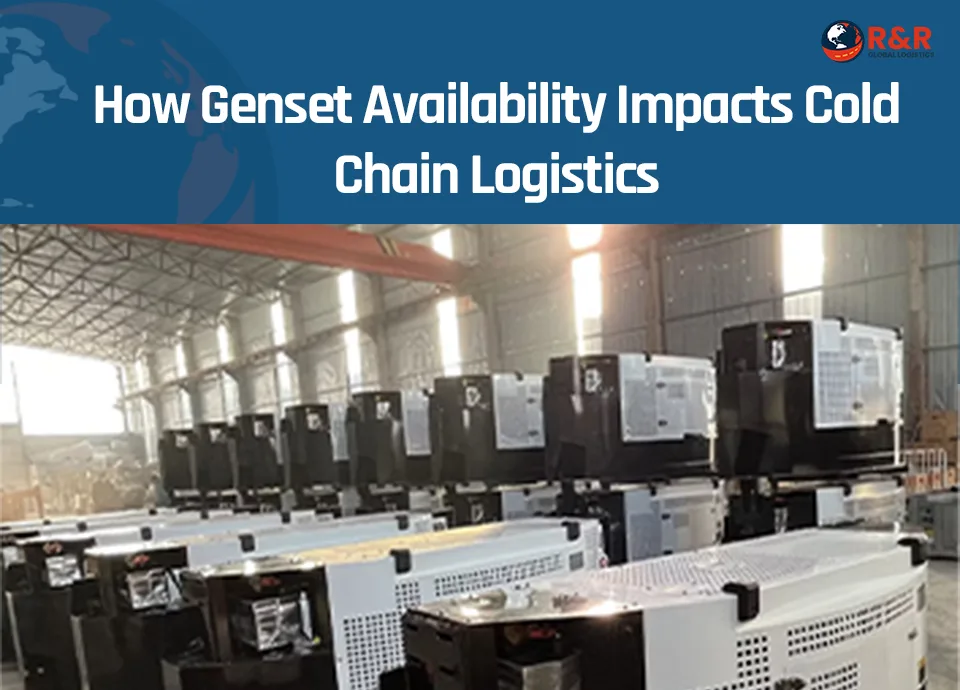Introduction: The Fragile Balance of Cold Chain Logistics
When it comes to cold chain logistics, every degree matters. From fresh produce to life-saving pharmaceuticals, temperature-sensitive cargo relies on uninterrupted refrigeration to maintain safety, quality, and compliance. But there’s a key component most shippers overlook — gensets.
Gensets (generator sets) are essential for powering reefer containers when access to a plugged-in power source is not available — especially during drayage, long-haul transit, or port congestion. And when genset availability becomes scarce, the consequences can be severe.
In this blog, we explore how genset shortages disrupt cold chain logistics, what industries are most at risk, and how R&R Global Logistics ensures reliable genset access when you need it most.
What Are Gensets in Logistics?
A genset, short for generator set, is a portable power unit designed to supply electricity to reefer containers (refrigerated containers) that transport perishable goods.
There are three types of gensets commonly used in the logistics industry:
- Clip-on gensets – attach to the front of a container
- Underslung gensets – mounted underneath chassis
- Truck-mounted gensets – installed on power units
Each type provides continuous power to reefers during times when stationary power sources are unavailable — including port exits, intermodal transfers, yard storage, or over-the-road hauls.
The Cold Chain’s Hidden Risk: Genset Shortages
Many companies assume gensets are always readily available. In reality, limited supply, increased reefer demand, and surging port traffic have created ongoing genset bottlenecks across major logistics hubs in the U.S.
When gensets are not available:
- Reefers may be delayed at the port
- Temperature control is lost during drayage
- Shippers risk cargo spoilage, FDA violations, and insurance claims
- Perishable shipments may be rerouted, rejected, or destroyed
Industries Most Impacted by Genset Unavailability
While genset shortages affect many supply chains, cold chain-dependent industries face the most risk:
1. Food & Beverage
- Fresh produce, dairy, seafood, and frozen goods require strict temperature adherence.
- A delay of even 2–3 hours without cooling can damage thousands of dollars in goods.
2. Pharmaceuticals & Healthcare
- Vaccines, insulin, and biologics often ship in reefer containers with specific temperature thresholds.
- Compliance with Good Distribution Practices (GDP) mandates continuous temperature logs.
3. Floral & Agriculture
- Flowers and plants are highly perishable and must remain in ideal climate conditions to retain commercial value.
4. Chemical & Industrial Materials
- Some chemical shipments require precise temperature control to remain stable or safe.
Real-World Impact: A Genset Delay Gone Wrong
Imagine a reefer loaded with $300,000 worth of frozen seafood arrives at a congested port, but no gensets are available for drayage to its inland destination. The shipment sits for 7 hours in ambient heat. When it finally moves, the internal temperature has climbed above the safety threshold.
Upon arrival, the cargo is rejected by the receiver due to spoilage. The shipper is now liable — not just for the lost product, but for transport costs, delays, insurance deductibles, and reputation loss.
How R&R Global Protects Your Cold Chain Logistics
At R&R Global Logistics, we’ve designed our operations to eliminate genset-related risks for temperature-sensitive cargo.
Guaranteed Genset Availability
We maintain strong partnerships with third-party genset providers and secure access to company-owned gensets and chassis. Our clients never worry about last-minute unavailability.
Real-Time Visibility
Through our transport management system (TMS), we track reefer loads in real time, ensuring genset usage and temperature logs are monitored across every segment.
24/7 Response for Reefer Loads
In case of emergency or delay, our cold chain specialists respond within minutes to reroute, recover, or resupply gensets wherever needed.
Port Coverage You Can Count On
We maintain daily presence at key ports and rail yards to proactively manage genset logistics, reduce container dwell time, and secure equipment before it’s scarce.
Best Practices for Shippers Using Reefer Containers
To stay protected, shippers moving temperature-sensitive freight should:
- Pre-book gensets in advance (especially during peak season)
- Work with a broker who owns or guarantees genset access
- Require TMS visibility for reefer temperature tracking
- Ask about contingency plans in case of genset failure
- Build relationships with flexible logistics partners who understand reefer urgency
The Bottom Line: Genset Planning Is Risk Management
Cold chain logistics is more than just reefer containers — it’s about ensuring continuous cooling, even during unpredictable port conditions and inland drayage.
When you ignore genset availability, you’re putting your cargo — and your customer relationships — at risk.
At R&R Global, we take cold chain logistics seriously. With reliable genset sourcing, real-time tracking, and a 98%+ on-time delivery rate, we ensure your freight stays fresh, compliant, and protected every mile of the way.
Final Thoughts
If you’re moving cold chain freight and tired of last-minute equipment issues, R&R Global is your logistics partner for peace of mind. Reach out today to learn how we can safeguard your supply chain.


1 Comment